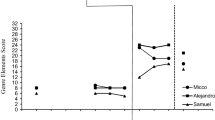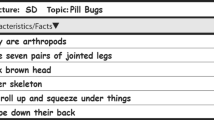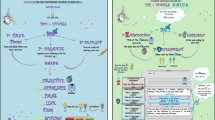Abstract
Mildly handicapped students experience serious difficulties in expository writing. Although researchers have documented the difficulties these students have with the mechanics of writing (Myklebust, 1973; Poplin, Gray, Larsen, Banikoski, & Mehring, 1980), there are more formidable and less visible difficulties in their abilities to construct well-formed prose and in the thinking processes that underlie text composition.
Access this chapter
Tax calculation will be finalised at checkout
Purchases are for personal use only
Preview
Unable to display preview. Download preview PDF.
Similar content being viewed by others
References
Bruce, B., Collins, A., Rubin, A.D., & Gentner, D. (1982). Three perspective on writing. Educational Psychologist, 17, 131 – 145.
Daiute, C. (1985). Do writers talk to themselves? In S. Freedman (Ed.), The acquisition of written language(pp. 133 – 159 ). Norwood NJ: Ablex.
Dyson, A.H. (1987). The value of “Time off task”: Young children’s spontaneous talk and deliberate text. Harvard Educational Review, 57, 396 – 419.
Englert, C.S., & Raphael, T.E. (1989). Developing successful writers through cognitive strategy instruction. In J.E. Brophy (Ed.), Advances in research on teaching(vol. 1, pp. 105 – 151 ). CT: JAI Press.
Englert, C.S., Raphael, T.E., & Anderson, L.M. (1989) Socially-mediated instruction: Improving students’ knowledge and talk about writing. Unpublished manuscript, Michigan State University: Institute for Research on Teaching, East Lansing.
Englert, C.S., Raphael, T.E., Anderson, L.M., Anthony, H.M., Stevens, D.D., & Fear, K.L. (1989). Making writing strategies and self-talk visible: Cognitive strategy instruction in writing in regular and special education classrooms. Unpublished manuscript, Michigan State University: Institute for Research on Teaching, East Lansing.
Englert, C.S., Raphael, T.E., Anderson, L.M., Gregg, S.L., & Anthony, H.M. (1989). Exposition: Reading, writing and the metacognitive knowledge of learning disabled students. Learning Disabilities Research, 5, 5 – 24.
Englert, C.S., Raphael, T.E., Fear, K.L., & Anderson, L.M. (1988). Students’ metacognitive knowledge about how to write informational texts. Learning Disability Quarterly, 11, 18 – 46.
Englert, C.S., & Thomas, C.C. (1987). Sensitivity to text structure in reading and writing: A comparison of learning disabled and nonhandicapped students. Learning Disability Quarterly, 10, 93 – 105.
Flower, L., & Hayes, J.R. (1981). A cognitive process theory of writing. College Composition and Communication, 35, 365 – 387.
Hayes, J.R., & Flower, L.S. (1987). On the structure of the writing process. Topics in Language disorders, 7, 19 – 30.
Hillocks, G. (1986). Research on written composition. Urbana, IL: National Conference on Research in English.
Isaacson, S. (1987). Effective instruction in written language. Focus on Exceptional Children, 19(6), 1 – 12.
Langer, J. A. (1981). From theory to practice: A prereading plan. Journal of Reading, 25, 152 – 156.
Lemke, J.L. (1982). Talking physics. Physics Education. 17, 263 – 267.
Meyer, B.J.F. (1975). The organization of prose and its effects on memory. Amersterdam: North-Holland.
Meyer, B.J.F., Brandt, D.H., & Bluth, G.J. (1980). Use of author’s textual schema. Key for ninth-graders’ comprehension. Reading Research Quarterly, 16, 72 – 103.
Myklebust, H.R. (1973). Development and disorders of written language. Vol. 2. Studies of normal and exceptional children. New York: Grune and Stratton.
Palincsar, A.S., & Brown, A.L. (1984). Reciprocal teaching of comprehension-fostering and comprehension-monitoring activities. Cognition and Instruction, 1, 117 – 175.
Poplin, M.S., Gray, R., Larsen, S., Banikowski, A., & Mehring, T (1980). A comparison of written expression abilities in learning disabled and non-learning disabled students at three grade levels. Learning Disability Quarterly, 3, 46 – 53.
Poteet, J. A. (1978). Characteristics of written expression of learning disabled and non-learning disabled elementary school students. (ERIC Document ED 1590830). Muncie, IN: Ball State University.
Raphael, T.E., Englert, C.S., & Kirschner, B.W. (1986). The impact of text structure instruction within a process writing orientation on fifth and sixth grade students’ comprehension and production of expository text. Paper presented at the American Educational Research Association, San Francisco.
Raphael, T.E., & Englert, C.S. (1990). Reading and writing: Partners in constructing meaning. The Reading Teacher, 43, 388 – 400.
Scardamalia, M., & Bereiter, C. (1983). The development of evaluative, diagnostic and remedial capabilities in children’s composing. In M. Martlew (Ed.), The psychology of written language: Developmental and educational perspectives(pp. 67 – 95 ). London: Wiley.
Scardamalia, M., & Bereiter, C. (1986). Written composition. In M. Wittrock (Ed.,), Handbook of research on teaching(3rd ed., pp. 778 – 803 ). New York: Macmillan.
Scardamalia, M., & Bereiter, C. (1987). Knowledge telling and knowledge transforming in written composition. In S. Rosenberg (Ed.), Advances in applied psvcholinguistics: Vol. 2. Reading, writing, and language learning(pp. 142 – 175 ). Cambridge: Cambridge University Press.
Tharp, R.G., & Gallimore, R. (1988). Rousing minds to life: Teaching, learning, and schooling in social context. New York: Cambridge University Press.
Vygotsky, L. (1978). Mind in society: The development of higher psychological processes. M. Cole, V. John-Steiner, S. Scribner, & E. Souberman, Eds. & Trans. Cambridge, MA: Harvard University Press.
Wong, B.Y.L., Wong, R., & Blenkisop, J. (1989). Cognitive and metacognitive aspects of learning-disabled adolescents’ composing problems. Learning Disability Quarterly, 12, 300 – 323.
Editor information
Editors and Affiliations
Rights and permissions
Copyright information
© 1990 Springer-Verlag New York Inc.
About this chapter
Cite this chapter
Englert, C.S. (1990). Unraveling the Mysteries of Writing Through Strategy Instruction. In: Scruggs, T.E., Wong, B.Y.L. (eds) Intervention Research in Learning Disabilities. Springer, New York, NY. https://doi.org/10.1007/978-1-4612-3414-2_8
Download citation
DOI: https://doi.org/10.1007/978-1-4612-3414-2_8
Publisher Name: Springer, New York, NY
Print ISBN: 978-0-387-97280-0
Online ISBN: 978-1-4612-3414-2
eBook Packages: Springer Book Archive




